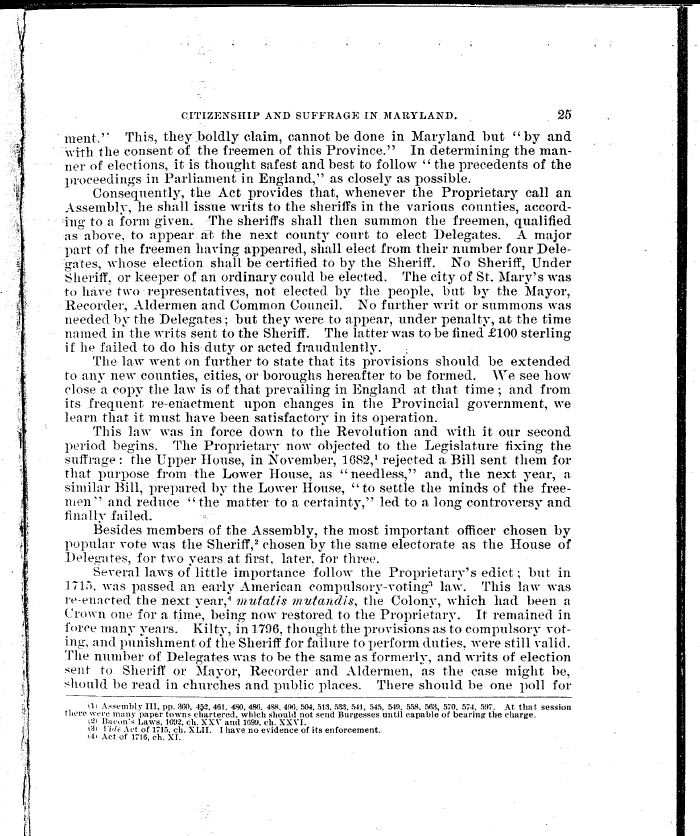|
CITIZENSHIP AND SUFFRAGE IN MARYLAND. `,Z5
meat.." This, they =boldly claim, cannot be done in Maryland but " by and
lvith the consent of the freemen of this Province." In determining the man-
ner of elections, it is thought safest and best to follow " the precedents
of the
proceedings in Parliament in England," as closely as possible.
Consequently, the Act provides that, whenever the Proprietary call an
Assembly, he shall issue writs to the sheriffs in the various counties,
a.ccord-
im(, to a form given.- -The sheriffs shall then summon the freemen,
qualified
as above, to appear at the next county court to elect Delegates. A major
part of the freemen having appeared, shall elect from their number four
Dele-
iVates, whose election shall be certified to by the Sheriff. NO Sheriff,
Under
sheriff, or keeper of an ordinary could be elected. The city of St. llary's
was
to have two representatives, not elected. by the people, but by the Mayor,
Recorder, Aldermen and Common Council. No farther writ or summons was
needed by the Delegates; but they were to appear, under penalty, at the time
named in the writs sent to the Sheriff. The latter was to be fined £100
sterling
if he failed to do his duty or acted fraudulently.
The law went on further to state that its provisions should be extended
to any new counties, cities, or boroughs hereafter to be formed. We see how
close a copy the law is of that prevailing in England at that time ; and
from
its frequent re-enactment upon changes in the Provincial government, we
learn that it must lave been satisfactory in its operation.
This la«- was in force down to the Revolution and with it our second
period begins. The Proprietary now objected to the Legislature fixing the
suffrage : the Upper House, in November, 162,' rejected a Bill sent them for
that purpose from the Lower House, as " needless," and, tile next year, a.
similar Bill, prepared by the Lower Horse, " to settle the minds of the
free-
men" and reduce "the matter to a. certainty," led to a long controversy and
finally failed.
Besides members of the Assembly, the most important officer chosen by
popular vote was the Sheriff, 2 chosen by the same electorate as the House
of
I>ele,~-ates, for two years at first, later, for three.
Several la«-s of little importance follow the Proprietary's edict; but in
1 T l:i, was passed an early American compulsory-voting' law. This law was
re-enacted the next year,' 9n.2ctatis in,utccnctis, the Colony, which had
been a
('Town one for a time, being now restored to the Proprietary. It remained in
ft tree many years. hilty, in 1ii36, thought the provisions as to
compulsory vot-
in `;', and punishment of the Sheriff for failure to perform duties, were
still valid.
'flue number of Delegates was to be the same as formerly, and -writs of
election
•ent to Sheriff or -Mayor, Recorder and Aldermen, as the case might be,
•lwald be read in churches and public places. There should be one poll for
p~ A..ccin blc III, pp. 360, 45„ 961, 480, 486, 488.496, 504. 51:3. 5.3:3,
541, 545, 549, 558, ;>fw3, 570, 574, 597. At that. session
there w•rc m.y~ paper town, chartered, which should not send Burgesses
until capable of bearing the charge.
i=~ 13acun's Laws, 1GD2, ch. S\V and 1699, eh. S\VI.
t:B I'ile :1ct of 1715, ch. XLII. I have no evidence of its enforcement.
141 Act of 1716, ch. X1.
|

